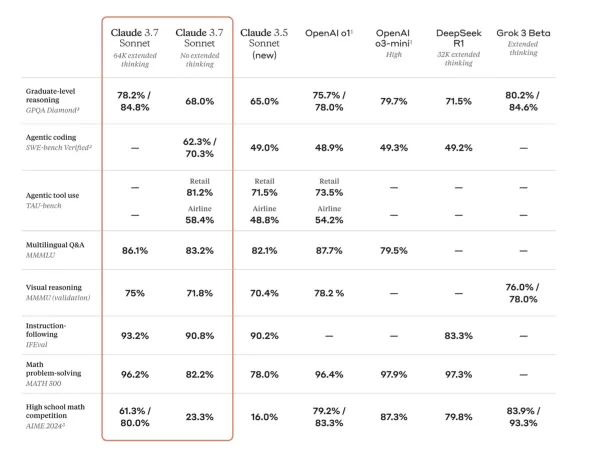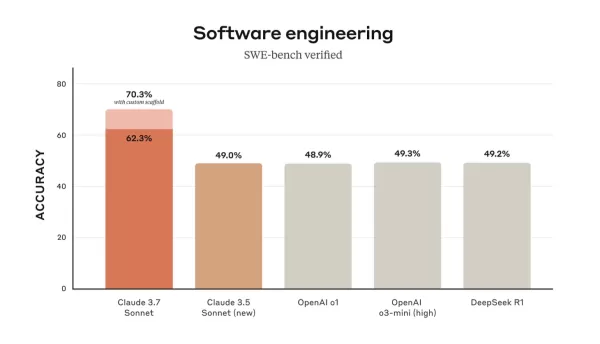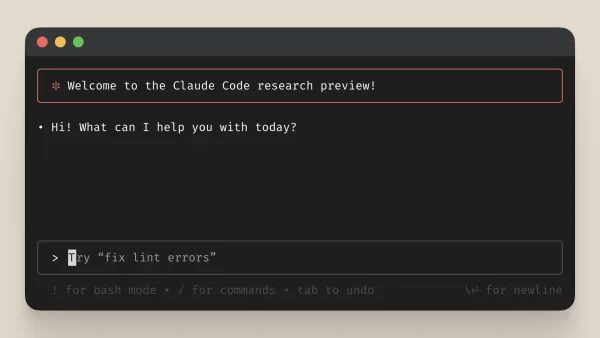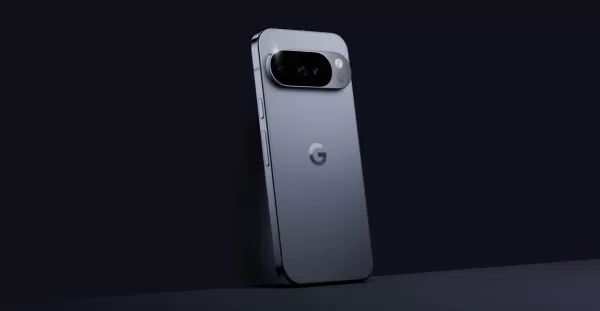Anthropic Unveils Its Smartest 'Hybrid Reasoning' AI Model Yet
Anthropic has just unveiled Claude 3.7 Sonnet, marking the debut of its first "hybrid reasoning model." This groundbreaking model is designed to tackle more intricate challenges and surpasses earlier iterations when it comes to tasks like mathematics and coding.
To complement this advancement, Anthropic is also launching a "limited research preview" of Claude Code, an agentic coding tool. While Anthropic already powers AI coding solutions like Cursor, Claude Code is being marketed as an interactive partner capable of searching and reading code, modifying files, writing and running tests, pushing code to GitHub, and utilizing command-line tools.
Claude 3.7 Sonnet will be accessible starting Monday within the Claude app and via Anthropic’s API, Amazon Bedrock, and Google Cloud’s Vertex AI. Pricing remains consistent with its predecessor, 3.5 Sonnet, at $3 per million input tokens and $15 per million output tokens.
Unlike competitors such as OpenAI, which offer distinct reasoning models, Anthropic emphasizes integrating reasoning capabilities directly into the model itself. As Dianne Penn, Anthropic’s product research lead, explained to The Verge, “We fundamentally believe that reasoning is a feature of the AI rather than something entirely separate.” For instance, Claude shouldn’t struggle much with straightforward queries like “What time is it?” but excels at handling complex prompts like planning a two-week trip to Italy while factoring in weather conditions.
 Anthropic
Anthropic
 Anthropic
Anthropic
Penn noted that Claude 3.7 Sonnet shows marked improvement in agentic coding, finance, and legal matters. Although Claude doesn’t yet support real-time web searches—a capability present in other models—it boasts a knowledge cutoff date of October 2024, making it more current. Developers can influence how the model operates through its scratchpad feature and specify exact response times. “Sometimes,” said Anthropic’s VP of product, Michael Gerstenhaber, “the developer simply needs to indicate that it shouldn’t take longer than 200 milliseconds to answer this question,” highlighting a strategic product decision.
Internally, Anthropic staff have utilized the new model to design front-end website interfaces, create interactive games, and engage in up to 45 minutes of coding activities, such as building test sets and refining test cases iteratively, according to Penn.

Claude Code. Anthropic
Penn mentioned that Anthropic evaluates its models’ capabilities by having them navigate an old-school Pokémon video game, mapping the model’s API to a controller interface. While Claude 3.5 Sonnet struggled to leave Pallet Town initially, Claude 3.7 successfully defeated several gym leaders.
Elon Musk’s recent unveiling of Grok-3 last week underscored the rapid pace of the AI model competition. For now, Anthropic stands ahead thanks to Claude 3.7 Sonnet’s impressive performance. Its release hints at a future where a single model handles every task, rather than requiring specialized tools for different functions.
Related article
 Pebble Reclaims Its Original Brand Name After Legal Battle
The Return of Pebble: Name and AllPebble enthusiasts can rejoice - the beloved smartwatch brand isn't just making a comeback, it's reclaiming its iconic name. "We've successfully regained the Pebble trademark, which honestly surprised me with how smo
Pebble Reclaims Its Original Brand Name After Legal Battle
The Return of Pebble: Name and AllPebble enthusiasts can rejoice - the beloved smartwatch brand isn't just making a comeback, it's reclaiming its iconic name. "We've successfully regained the Pebble trademark, which honestly surprised me with how smo
 Midjourney Unveils Cutting-Edge AI Video Generator for Creative Content
Midjourney's AI Video Generation BreakthroughMidjourney has unveiled its inaugural AI video generation tool, marking a significant expansion beyond its renowned image creation capabilities. The initial release enables users to transform both uploaded
Midjourney Unveils Cutting-Edge AI Video Generator for Creative Content
Midjourney's AI Video Generation BreakthroughMidjourney has unveiled its inaugural AI video generation tool, marking a significant expansion beyond its renowned image creation capabilities. The initial release enables users to transform both uploaded
 Google Curbs Pixel 10 Leaks by Officially Revealing the Smartphone Early
Google is teasing fans with an early glimpse of its upcoming Pixel 10 smartphone lineup, showcasing the official design just weeks before the scheduled August 20th launch event.A promotional video on Google's website reveals a sleek grayish-blue devi
Comments (1)
0/200
Google Curbs Pixel 10 Leaks by Officially Revealing the Smartphone Early
Google is teasing fans with an early glimpse of its upcoming Pixel 10 smartphone lineup, showcasing the official design just weeks before the scheduled August 20th launch event.A promotional video on Google's website reveals a sleek grayish-blue devi
Comments (1)
0/200
![JoeCarter]() JoeCarter
JoeCarter
 August 14, 2025 at 1:00:59 AM EDT
August 14, 2025 at 1:00:59 AM EDT
This new Claude 3.7 sounds wild! 🤯 Hybrid reasoning? That's like giving AI a supercharged brain for math and coding. Can't wait to see how it stacks up against others in real-world tasks.


 0
0
Anthropic has just unveiled Claude 3.7 Sonnet, marking the debut of its first "hybrid reasoning model." This groundbreaking model is designed to tackle more intricate challenges and surpasses earlier iterations when it comes to tasks like mathematics and coding.
To complement this advancement, Anthropic is also launching a "limited research preview" of Claude Code, an agentic coding tool. While Anthropic already powers AI coding solutions like Cursor, Claude Code is being marketed as an interactive partner capable of searching and reading code, modifying files, writing and running tests, pushing code to GitHub, and utilizing command-line tools.
Claude 3.7 Sonnet will be accessible starting Monday within the Claude app and via Anthropic’s API, Amazon Bedrock, and Google Cloud’s Vertex AI. Pricing remains consistent with its predecessor, 3.5 Sonnet, at $3 per million input tokens and $15 per million output tokens.
Unlike competitors such as OpenAI, which offer distinct reasoning models, Anthropic emphasizes integrating reasoning capabilities directly into the model itself. As Dianne Penn, Anthropic’s product research lead, explained to The Verge, “We fundamentally believe that reasoning is a feature of the AI rather than something entirely separate.” For instance, Claude shouldn’t struggle much with straightforward queries like “What time is it?” but excels at handling complex prompts like planning a two-week trip to Italy while factoring in weather conditions.
 Anthropic
Anthropic Anthropic
Anthropic
Penn noted that Claude 3.7 Sonnet shows marked improvement in agentic coding, finance, and legal matters. Although Claude doesn’t yet support real-time web searches—a capability present in other models—it boasts a knowledge cutoff date of October 2024, making it more current. Developers can influence how the model operates through its scratchpad feature and specify exact response times. “Sometimes,” said Anthropic’s VP of product, Michael Gerstenhaber, “the developer simply needs to indicate that it shouldn’t take longer than 200 milliseconds to answer this question,” highlighting a strategic product decision.
Internally, Anthropic staff have utilized the new model to design front-end website interfaces, create interactive games, and engage in up to 45 minutes of coding activities, such as building test sets and refining test cases iteratively, according to Penn.

Claude Code. Anthropic
Penn mentioned that Anthropic evaluates its models’ capabilities by having them navigate an old-school Pokémon video game, mapping the model’s API to a controller interface. While Claude 3.5 Sonnet struggled to leave Pallet Town initially, Claude 3.7 successfully defeated several gym leaders.
Elon Musk’s recent unveiling of Grok-3 last week underscored the rapid pace of the AI model competition. For now, Anthropic stands ahead thanks to Claude 3.7 Sonnet’s impressive performance. Its release hints at a future where a single model handles every task, rather than requiring specialized tools for different functions.
 Pebble Reclaims Its Original Brand Name After Legal Battle
The Return of Pebble: Name and AllPebble enthusiasts can rejoice - the beloved smartwatch brand isn't just making a comeback, it's reclaiming its iconic name. "We've successfully regained the Pebble trademark, which honestly surprised me with how smo
Pebble Reclaims Its Original Brand Name After Legal Battle
The Return of Pebble: Name and AllPebble enthusiasts can rejoice - the beloved smartwatch brand isn't just making a comeback, it's reclaiming its iconic name. "We've successfully regained the Pebble trademark, which honestly surprised me with how smo
 Midjourney Unveils Cutting-Edge AI Video Generator for Creative Content
Midjourney's AI Video Generation BreakthroughMidjourney has unveiled its inaugural AI video generation tool, marking a significant expansion beyond its renowned image creation capabilities. The initial release enables users to transform both uploaded
Midjourney Unveils Cutting-Edge AI Video Generator for Creative Content
Midjourney's AI Video Generation BreakthroughMidjourney has unveiled its inaugural AI video generation tool, marking a significant expansion beyond its renowned image creation capabilities. The initial release enables users to transform both uploaded
 Google Curbs Pixel 10 Leaks by Officially Revealing the Smartphone Early
Google is teasing fans with an early glimpse of its upcoming Pixel 10 smartphone lineup, showcasing the official design just weeks before the scheduled August 20th launch event.A promotional video on Google's website reveals a sleek grayish-blue devi
Google Curbs Pixel 10 Leaks by Officially Revealing the Smartphone Early
Google is teasing fans with an early glimpse of its upcoming Pixel 10 smartphone lineup, showcasing the official design just weeks before the scheduled August 20th launch event.A promotional video on Google's website reveals a sleek grayish-blue devi
 August 14, 2025 at 1:00:59 AM EDT
August 14, 2025 at 1:00:59 AM EDT
This new Claude 3.7 sounds wild! 🤯 Hybrid reasoning? That's like giving AI a supercharged brain for math and coding. Can't wait to see how it stacks up against others in real-world tasks.


 0
0





























